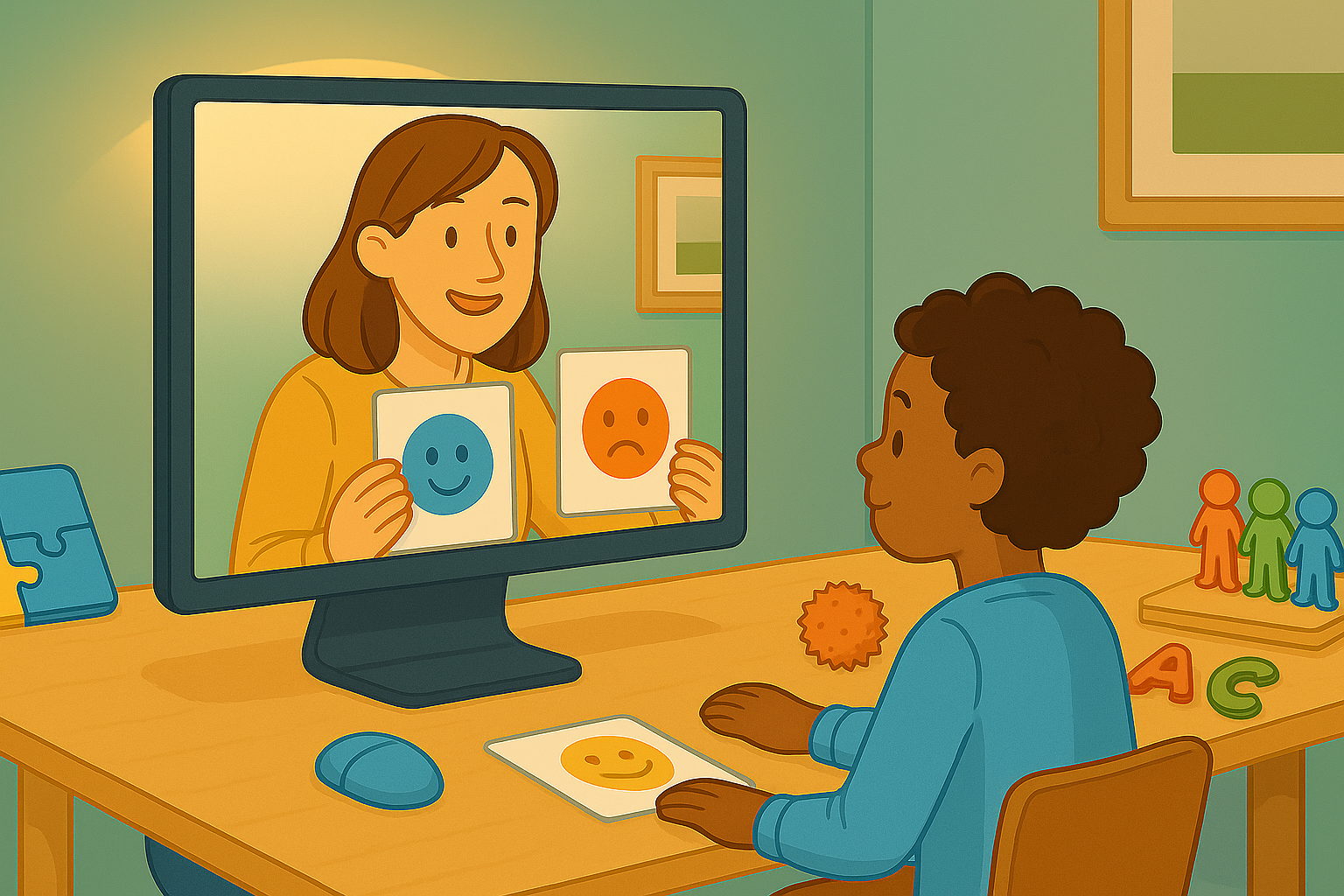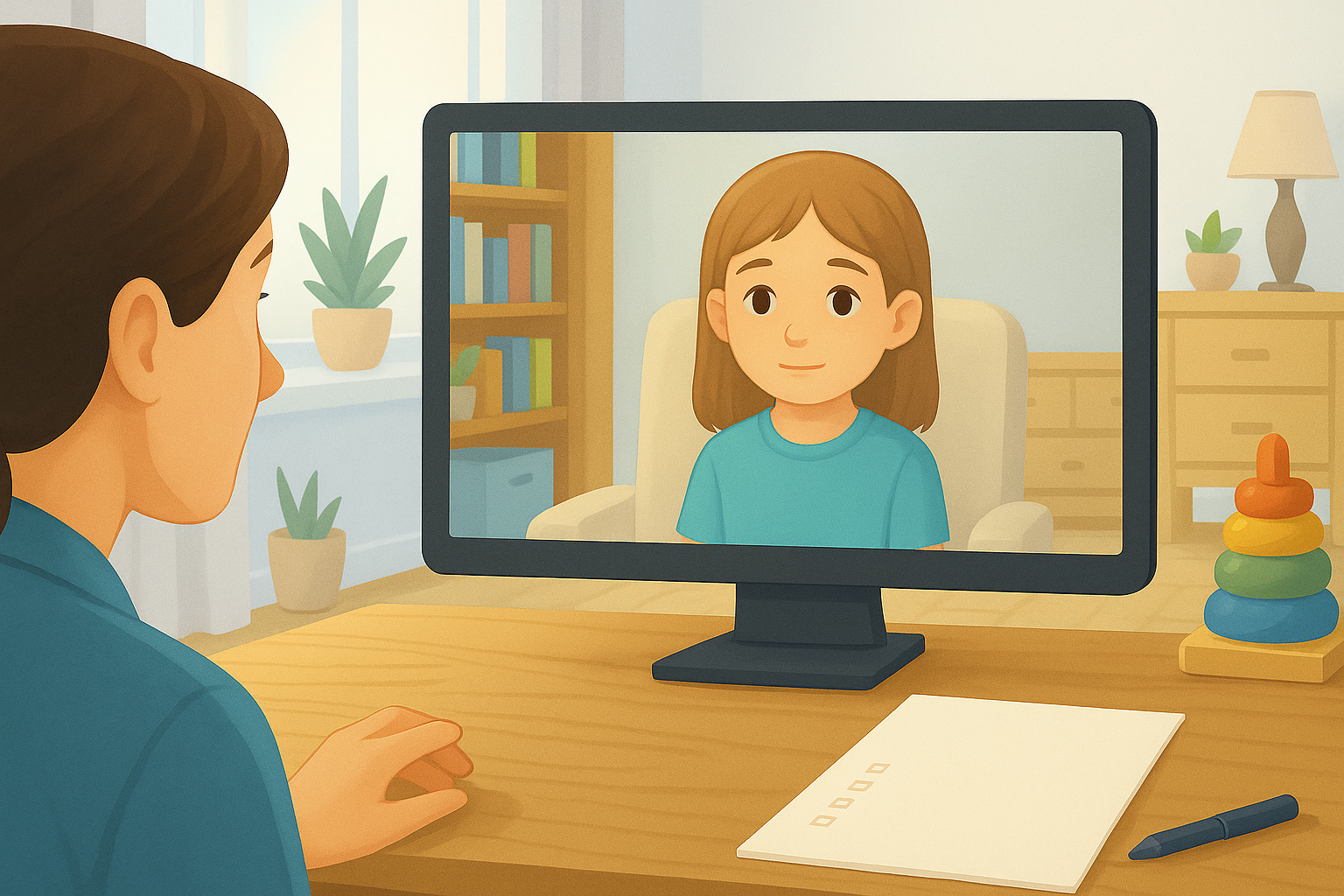
can specialised behaviour therapy be done online?
18 June, 2025
 Key Highlights
Key Highlights
-
Telehealth platforms enable effective delivery of online behaviour therapy, ensuring support reaches families regardless of location.
-
Qualified behaviour support practitioners lead sessions tailored to address children’s specific needs and mental health challenges.
-
Online therapy enhances accessibility for families, especially for NDIS participants in rural or remote areas across Australia.
-
Strategies such as positive behaviour support and early intervention prioritise the improvement of a person’s quality of life.
-
Virtual sessions address common challenges like autism spectrum disorder (ASD) and other behaviours of concern.
-
Secure and private platforms uphold confidentiality, ensuring the safety of NDIS participants during telehealth sessions.
Introduction
Navigating mental health and behavioural issues in children can be challenging for parents. Behaviour support practitioners offer valuable tips and strategies to foster positive behaviour at home. With new telehealth tools, families can access these services online without leaving their homes, allowing them to collaborate with practitioners who tailor plans to their child's specific needs. These personalised plans can aid in their child's development and well-being. However, many wonder if online therapy with behaviour support effectively contributes to improved mental health and behaviour outcomes.
Understanding Specialised Behaviour Therapy
 Specialised behaviour therapy is a focused way to find and help with behavioural challenges that affect your everyday life. This approach is not like general methods. It gives a clear path to make long-lasting changes in how you talk with others, act around people, and control your feelings.
Specialised behaviour therapy is a focused way to find and help with behavioural challenges that affect your everyday life. This approach is not like general methods. It gives a clear path to make long-lasting changes in how you talk with others, act around people, and control your feelings.
Therapy starts with making a support plan for your behaviour. Clinicians, support teams, and family members work together to set this up. This plan helps you handle your issues and builds an environment that makes your quality of life better.
What Makes Behaviour Therapy ‘Specialised’?
"Specialised behaviour therapy" tailors treatment to meet the unique needs of NDIS participants. Experienced clinicians collaborate with individuals to identify the root causes of certain behaviours, which may stem from frustration, anxiety, or environmental factors.
A support plan is developed after thorough assessments, outlining strategies to enhance communication, social skills, and emotional regulation. This may involve modifying the environment to reduce stressors like excessive noise.
Typically employing positive reinforcement techniques, this approach rewards desirable behaviours with meaningful incentives. The focus remains on the individual, empowering children and families to tackle daily challenges and achieve key mental health goals through the support plan.
Types of Behavioural Challenges Addressed
Specialised online behaviour therapy can help children with many different challenges and help them feel better. It can be used for things like:
-
Autism spectrum disorder (ASD): Children get support with steps made for them. This helps them be better in relationships and talk with people.
-
Behaviours of concern: This means working on aggression, self-harm, or acting out, which get in the way of their daily life.
-
Avoiding restrictive practices: It means cutting down on controlling rules by using better ways to help children.
-
Anxiety and stress management: Kids learn helpful ways to deal with their feelings and worry.
Behaviour therapy helps boost skills, too. It be good for social life and handling emotions. By looking at all these areas, health professionals and caregivers can help make real change. This leads to a better quality of life for kids with autism or ASD.
How Does Online Behaviour Therapy Work?
 Online behaviour therapy uses telehealth to give support through online sessions. Families get clear plans made by behaviour support practitioners. These plans match what each child needs.
Online behaviour therapy uses telehealth to give support through online sessions. Families get clear plans made by behaviour support practitioners. These plans match what each child needs.
With this online setup, the team works closely with parents and support workers. They help put changes in place that help the child's behaviour. Kids learn new skills step by step. The team checks on how things are going and makes sure the plan changes as the child grows. This way of care is very useful for families who want help to be easy to get and just as good.
Telehealth Technology and Security
Telehealth platforms prioritise safety and security, allowing families to access therapy without concerns about privacy breaches. Virtual sessions protect conversations and messages through encrypted systems, keeping personal information confidential. Emails, session times, and plans are consistently safeguarded. Therapists adhere to professional guidelines, ensuring NDIS participants and their families feel secure using these services. Regular updates maintain compliance with regulations, reaffirming that child well-being is paramount. Telehealth combines advanced technology with expert support, making online behaviour therapy a safe and dependable option.
Steps Involved in Starting Virtual Sessions
Families can get started with virtual therapy by taking a few simple steps:
-
Initial Inquiry: Talk to support workers or clinicians about your worries and get further information.
-
Assessment: Go through an assessment to help create a support plan just for you.
-
Technology Setup: Make sure you have the right devices and a good internet connection. This is important for smooth telehealth visits.
-
Scheduling: Work with practitioners to pick times for your sessions, so your child can have a steady routine.
Support workers, along with parents and behaviour support practitioners, work together to make sure everything runs well and children get the most out of each telehealth session.
Benefits of Online Behaviour Therapy for Children
 Online therapy allows children to receive professional help from home, fostering positive behaviour in a safe environment. Each child receives tailored support and tools that suit their needs. Therapists assist kids in learning and managing behaviours through video calls, leading to gradual yet meaningful progress. Parents can participate in these sessions, strengthening their child's mental health and creating a collaborative support system.
Online therapy allows children to receive professional help from home, fostering positive behaviour in a safe environment. Each child receives tailored support and tools that suit their needs. Therapists assist kids in learning and managing behaviours through video calls, leading to gradual yet meaningful progress. Parents can participate in these sessions, strengthening their child's mental health and creating a collaborative support system.
Increased Accessibility for Families in Australia
Families in remote areas of Australia often struggle to access mental health services. Online behavioural therapy, provided by professionals knowledgeable about NDIS rules, addresses this issue. Virtual tools enable caregivers and children in hard-to-reach locations to connect with behaviour support specialists, eliminating travel challenges and saving time while ensuring quality care. Flexible scheduling allows families to participate in vital therapy sessions despite their busy lives. This nationwide access facilitates essential mental health support for both children and adults, promoting overall well-being.
Comfort and Familiarity of the Home Environment
The home environment is a good place for virtual therapy. Children be more comfy and sure of themselves when they are at home. It helps them take part more and pick up new skills much faster.
Carers and therapists work together from far away. They share practical advice that parents can use right away in the home. This way, what children learn in therapy fits right into daily life, so children use new skills more often.
Being at home is good for children who do not like changes or who feel anxious. It takes away things that may upset them. Then, children can talk better and handle emotions in a better way.
Who Can Benefit from Online Behaviour Therapy?
Online behaviour therapy helps people of all ages. It gives support to children who may have trouble as they grow, and also helps adults who need to manage how they feel. This kind of therapy is done online and works well for many different needs.
With personalised support plans, people who take part and their families can get the help they need. By letting caregivers, professionals, and support people work together, therapy opens ways for people to get better and learn new skills. This teamwork helps everyone move closer to reaching their goals.
Suitable Age Groups and Diagnoses
The versatility of online behaviour therapy means that the help can work for people in all age groups. For young children who need early intervention, this type of therapy can give them important tools to handle challenges like autism.
There are clinicians called speech pathologists. They work to help children get better at talking and understanding, which can help them beat barriers. Also, teenagers who deal with stress or show worrying actions may find the online setup safe and easy to use.
For adults who have their own challenges, online therapy uses plans made just for them. This help allows adults to live more on their own and helps to make a support system that fits people of all ages.
Signs Your Child May Benefit from Online Support
Parents may see signs that show their child is having a hard time and may need early childhood intervention:
-
Their child has outbursts often or shows behaviours of concern. These get in the way of doing things every day.
-
The child finds it hard to fit in with other kids or keeps to themselves.
-
The child struggles to handle their feelings. This can make them feel more worried or annoyed.
-
The child finds it hard to learn new skills and use them in daily life.
Talking to a trained NDIS behaviour support practitioner can help parents find out what is going on. This support helps them use ways like CBT to help the child and make good changes that last.
Is Online Therapy Right for Every Child?
Virtual therapy has many good points, but it is key to think about the individual needs of each child. Some children will do well in online sessions. Others may need to meet face-to-face to feel fully supported.
Health professionals, parents, and support teams work together to make plans just for the child. These plans should fit the child’s own situation. When everyone keeps talking and sharing, families can make good choices for their child’s mental health and well-being.
Ready to Try Online Behaviour Support?
Accessing behaviour support online has never been easier — and it’s fully NDIS-compliant. At daar, our qualified behaviour support practitioners work with you to create personalised plans through secure, convenient telehealth sessions.
We guide families step-by-step, teaching effective strategies to reduce challenging behaviours and support long-term progress. Whether you're in Liverpool or Canterbury, our online sessions ensure your child receives consistent, high-quality care — wherever you are.
Looking to begin? Learn more about our online behaviour therapy services and speak with our team today.
Conclusion
To sum up, online behaviour therapy gives children a way to get help that is made just for them in a space they know and feel safe in. Telehealth makes this support easier to get for families all across Australia. It helps give care to children, no matter where they are. Using new technology, our team can work with you to help with many different behaviour issues.
Frequently Asked Questions
Is online behaviour therapy as effective as in-person sessions?
Research shows that online behaviour therapy can work as well as meeting someone face-to-face for many people. Things like the therapist’s skill, the bond between the client and the therapist, and how comfortable a person feels all have a big effect on how well the therapy works.
What equipment do I need for my child to attend online sessions?
To use telehealth, you need to have a good internet connection. You also need a computer or tablet. It is important to have an email account, too. In Australia, support workers can help families. They make it easier for people to get into telehealth services online.
How are parents involved in virtual therapy?
Parents are key support people who work with therapists to help children keep up positive behaviour at home. They do this by watching progress, using helpful ideas, and giving emotional support. All of this helps boost their child's mental health.
Are sessions secure and private?
Absolutely. Telehealth platforms always focus on strong security. They follow strict privacy rules for NDIS participants. Health professionals give their advice and keep everything private during therapy. This helps people know that their sessions are safe and their information is kept private in the telehealth process for NDIS participants.
.svg)






